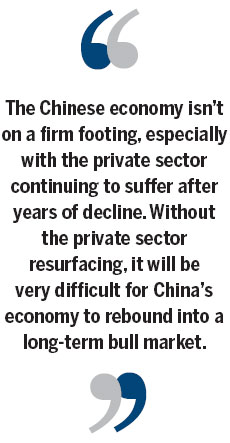Predictably, it's anyone's guess
Updated: 2013-02-22 09:33
By Zhang Xiao (China Daily)
|
|||||||||||

Changes by new leaders bode well for China's economy, but many challenges loom
For much of 2012, China's stock markets trended downward, though other major markets from around the world showed signs of growth. And although 2012 ended with a much-needed rebound, the outlook for this year is mixed at best.
Luckily for China's markets, the central government has finalized its changing of the guard. The new leadership has demonstrated a down-to-earth approach to many issues. They started small and required meetings to be more efficient and effective, and did away with reading long speeches, as well as clearing long stretches of roads for the safe passage of officials en route to meetings. Lavish banquets for government officials, state-owned enterprises and military personnel have apparently been banned.
Though these steps might seem small, the new approach is more effective in creating a fresh atmosphere and encouraging public trust in the government. Establishing trust could spread to all parts of the nation and perhaps to China's economy.
But the challenge for China's top leaders is to make sure their policies are fully executed to the benefit of the public. If 2012 marks a political power shift at the top, 2013 will be the year changes ripple through its entire political system.
The new leadership has been open and determined to fight corruption and downsize its bulky political system. If the new leaders succeed, the system will be more agile in dealing with growing challenges.
Of course, these deep-rooted changes carry inherent risks and the impact of these changes to the nation's economy and stock markets is now under close scrutiny. With the global economy in the doldrums over the past few years, the Chinese economy is not immune to the downward trend. Exports have been cut drastically and China has been working hard to stimulate domestic demand as a countermeasure.
But if the global economy stabilizes, the Chinese economy will obviously improve, especially if domestic consumption rises sharply. If all goes well, a Chinese economic rebound could have a steeper trajectory, despite the fact that the nation's stock markets are late to respond because of the political shifts in power.
With that said, no market can soar without hiccups. In 2010 and 2011, the number of Chinese IPOs exceeded 300, the highest in the world. That number was halved in 2012 and in the past six months, only a few Chinese companies have gone public.
The real challenge for the Chinese stock market in 2013 is the release of formerly non-tradable shares that are worth about 2 trillion yuan ($322 billion; 240 billion euros). That amount is larger than the funds raised from domestic and international IPOs and follow-up offerings combined.
Ironically, a healthy dose of suspicion in the current market actually helps China's indices continue their ascent. But the release of the non-tradable shares has the potential to kick supply and demand out of whack. Sales of those shares could put a cap on how high China's stock indices can climb.
Meanwhile, the Chinese economy isn't on a firm footing, especially with the private sector continuing to suffer after years of decline. Without the private sector resurfacing, it will be very difficult for China's economy to rebound into a long-term bull market.
Looking abroad, several Chinese companies listed overseas have been cast off by investors due to various accounting issues and a mishandling of questions that investors have raised.
Though only a handful of Chinese companies have actually had accounting problems, investors don't want to deal with these issues when they are already facing plenty of uncertainty.
Declining prices for Chinese companies in secondary global markets is another issue worth examining, because there are no non-tradable shares to be released. These overseas Chinese firms have been hammered and many of the weaker ones have been whittled down to nothing because of the relentless downward push of the global market over the years.
No reasonable man likes to predict what an unreasonable thing like the stock market will do, because there are so many factors involved. This year, there are many wild cards in play. For one, tension between China and its neighboring countries is escalating over the Diaoyu Islands and the South China Sea. With jets and warships constantly cruising the regions and war games occurring with alarming frequency, it's anyone's guess if military conflict will make the headlines and what impact these crisis areas could bring to stock markets around the world.
The Year of the Snake in the Chinese zodiac is often marked with unpredictability and so is the state of this year's Chinese stock market.
The author is executive vice-president of Shenzhen Co-Win Venture Capital Investments Ltd.
(China Daily 02/22/2013 page7)
Today's Top News
List of approved GM food clarified
ID checks for express deliveries in Guangdong
Govt to expand elderly care
University asks freshmen to sign suicide disclaimer
Tibet gears up for new climbing season
Media asked to promote Sino-Indian ties
Shots fired at Washington Navy Yard
Minimum growth rate set at 7%
Hot Topics
Lunar probe , China growth forecasts, Emission rules get tougher, China seen through 'colored lens', International board,
Editor's Picks

|

|

|

|

|

|





